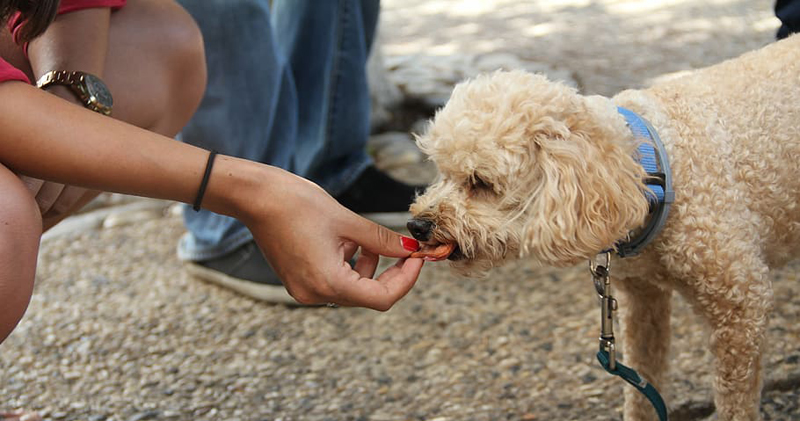Your poodle’s picky eating habits may be a source of frustration for you as a dog owner. It’s important to understand that picky eating is actually quite common among poodles, and there are a variety of reasons why this might be the case.
One possible explanation for your poodle’s picky eating is their sensitive nature. Poodles tend to be highly sensitive dogs, both physically and emotionally. This sensitivity can extend to their palates, making them more selective about what they eat. Additionally, certain poodle breeds, such as the Toy Poodle, have smaller appetites and may require less food compared to larger breeds. Understanding these unique characteristics can help you better cater to your poodle’s specific dietary needs.
If your poodle is a picky eater, there could be several reasons. Poodles are known to be intelligent and independent dogs, which can sometimes translate to selective eating habits. It’s important to ensure that your poodle is receiving a balanced diet and that there are no underlying health issues. Additionally, poodles may develop food preferences or aversions based on past experiences or conditioning. To address picky eating, try offering a variety of high-quality dog food options and consult with a veterinarian for further guidance.

Why is My Poodle a Picky Eater?
A picky eater can be quite frustrating, especially when it comes to our beloved poodles. We want them to thrive and enjoy their meals, but sometimes they refuse to eat or show a strong preference for certain foods. If you’re wondering why your poodle is a picky eater, this article will explore some possible reasons and provide you with insights on how to address this issue.
Food Sensitivities or Allergies
One possible reason why your poodle is a picky eater is that they might have food sensitivities or allergies. Just like humans, dogs can develop sensitivities to certain ingredients in their food. This can lead to digestive discomfort, skin issues, or other symptoms that cause them to avoid certain foods.
If you suspect that your poodle has food sensitivities or allergies, it’s important to consult with your veterinarian. They can help you identify the specific ingredients causing the issue and recommend a suitable diet for your picky eater. It may be necessary to switch to a limited ingredient diet or a hypoallergenic formula to alleviate the symptoms and encourage your poodle to eat.
Previous Negative Experiences
Poodles, like many other animals, have a remarkable memory. If they have previously had negative experiences with certain foods, they may develop aversions to those particular items. These negative experiences could include upset stomachs, bouts of vomiting, or even associating the food with a distressing event.
If your poodle is a picky eater due to previous negative experiences, it’s crucial to identify and address those associations. Gradually reintroduce the food in small portions and make it a positive experience by offering praise and rewards. Additionally, consult with your veterinarian to rule out any underlying health issues that may have contributed to the negative experiences.
Behavioral Factors
Some poodles are picky eaters due to behavioral factors. These intelligent and sensitive dogs may refuse to eat if they feel anxious, stressed, or have a lack of routine. Changes in their environment, such as moving to a new house or the presence of unfamiliar people or animals, can disrupt their appetite.
To encourage your picky eater to consume their meals, establish a consistent feeding schedule and create a calm and peaceful environment during meal times. Avoid offering excessive treats or table scraps, as this can contribute to their picky eating habits. Additionally, engage in regular exercise and provide mental stimulation to keep your poodle happy and content.
Dental Health Issues
Poodles, especially as they age, can develop dental health issues that make it uncomfortable or painful for them to eat. Gum disease, tooth decay, or toothaches can discourage them from consuming their food. If your poodle is a picky eater and you notice signs of dental issues, such as bad breath, excessive drooling, or reluctance to chew, it’s essential to address their dental health.
Consult with your veterinarian to schedule a dental check-up for your poodle. They may recommend a professional cleaning and provide guidance on how to maintain good oral hygiene for your furry companion. By addressing any dental health issues, you can help alleviate their discomfort and improve their appetite.
Preference for Variety
Some poodles simply have a preference for variety in their diet. They may get bored with the same food every day and crave different flavors and textures. This preference for variety can manifest in picky eating behaviors, where they refuse their meals until presented with something new and exciting.
To accommodate your poodle’s preference for variety, consider introducing rotational feeding. This involves offering a variety of high-quality dog foods, switching between flavors or brands regularly. However, it’s important to make gradual transitions to avoid digestive upset. Consult with your veterinarian to ensure that you’re providing a nutritionally balanced diet for your picky eater.
Feeding Habits and Training
The feeding habits and training your poodle has been exposed to can influence their eating behavior. For example, if they have been fed table scraps or allowed to free-feed throughout the day, they may become selective and refuse their regular meals. Furthermore, inconsistent training or not establishing boundaries during meal times can contribute to picky eating.
To address these issues, establish a feeding routine and stick to specific mealtimes. Avoid offering table scraps and reinforce positive habits by using treats specifically designed for dogs. Consistent training and reinforcing boundaries during meal times will help your poodle understand and respect their designated eating area and the importance of their regular meals.
Age-Related Changes
As poodles age, their nutritional needs and appetites may change. Older poodles may require specialized senior dog food formulated for their unique needs. Additionally, age-related health conditions, such as decreased sense of smell or dental issues, can contribute to picky eating habits.
If you have an older poodle who is a picky eater, consult with your veterinarian to ensure their nutritional needs are being met. They may recommend dietary adjustments or supplements to support their overall health. Regular veterinary check-ups are essential to catch any age-related health issues early and provide appropriate care.
Socialization and External Factors
Poodles, being sociable dogs, can be influenced by external factors during meal times. For example, if they are exposed to aggressive or dominant dogs during feeding, they may develop anxiety or become protective of their food. This can lead to picky eating behavior.
Ensure that your poodle’s meal times are free from stress and potential conflicts with other animals. Feed them in a separate, quiet area where they can eat without feeling threatened. If the picky eating behavior persists, consider consulting with a professional dog trainer or behaviorist to address any underlying issues.
Underlying Health Issues
In some cases, picky eating in poodles may be a symptom of an underlying health issue. Medical conditions such as gastrointestinal disorders, dental problems, or even certain medications can affect their appetite and lead to picky eating habits.
If you’ve addressed all the possible reasons for your poodle’s picky eating and their behavior persists, it’s crucial to consult with your veterinarian. They can conduct a thorough examination, perform any necessary tests, and provide a proper diagnosis. Treating the underlying health issue may resolve the picky eating behavior.
Conclusion
Understanding why your poodle is a picky eater can help you address the issue effectively. Whether it’s due to food sensitivities, negative experiences, behavioral factors, or other reasons, there are steps you can take to encourage your picky eater to enjoy their meals. Remember to consult with your veterinarian for guidance and establish a routine that promotes a healthy and balanced diet for your poodle. With patience and consistency, you can help your poodle overcome their picky eating habits and thrive.
Why is My Poodle a Picky Eater? (Key Takeaways)
- Poodles may be picky eaters due to their sensitive digestive systems.
- Picky eating habits in poodles can be caused by stress or anxiety.
- A poodle’s breed tendencies, such as being a sniffer or grazer, can contribute to picky eating.
- Offering a variety of high-quality dog foods and incorporating rewards for positive eating behavior can help address picky eating in poodles.
- Consulting with a veterinarian is important to rule out any underlying health issues causing a poodle’s picky eating behavior.
Frequently Asked Questions
Poodles are known for their luxurious and curly coats, graceful appearance, and intelligence. However, sometimes they can be picky eaters, which can be concerning for their owners. If you find yourself asking, “Why is my poodle a picky eater?” this FAQ guide will provide you with some insights and answers to help you understand your poodle’s behavior.
1. What are some reasons why poodles may be picky eaters?
There can be several reasons why your poodle is a picky eater:
Firstly, poodles are known for being intelligent and sensitive dogs. They may have a discerning palate and prefer certain tastes and textures. Additionally, previous experiences or feeding habits can influence their eating preferences. If your poodle has been consistently fed a particular type of food, they may be hesitant to try something new.
2. How can I encourage my picky poodle to eat?
When dealing with a picky eater, it’s essential to be patient and try different strategies:
First, make sure you’re offering a high-quality and nutritious dog food that meets your poodle’s specific dietary needs. It’s important to consult with your veterinarian for dietary recommendations.
You can also try adding variety to their meals by mixing in wet food, adding a topper, or offering different flavors. Sometimes, the taste or texture of the food can entice them to eat.
3. Could there be any underlying health issues causing my poodle’s picky eating?
Yes, it’s possible that underlying health issues could contribute to your poodle’s picky eating habits:
Dental problems, such as tooth decay or gum disease, can make it uncomfortable for poodles to eat certain foods. Ensuring regular dental care and addressing any dental issues can help improve their appetite.
Other health conditions, such as gastrointestinal disorders or food allergies, can affect your poodle’s ability to eat comfortably. If you suspect a health issue, it’s crucial to consult with your veterinarian for a proper diagnosis and treatment plan.
4. Should I be concerned if my poodle is a picky eater?
While picky eating in poodles can be frustrating, it may not always be a cause for concern:
If your poodle is still maintaining a healthy weight, has a good energy level, and is overall healthy, their picky eating behavior might not be a significant issue. However, if you notice sudden changes in their eating habits or significant weight loss, it’s best to consult with your veterinarian to rule out any underlying health problems.
5. How can I establish a healthy eating routine for my poodle?
Creating a healthy eating routine for your poodle can help improve their eating habits:
Establish regular feeding times and avoid leaving food out all day. Offer meals at specific times and remove any uneaten portions after a reasonable period. This can help your poodle develop a consistent feeding routine.
It’s also important to avoid rewarding picky eating behavior. Offering treats or human food as a substitute can reinforce their picky habits. Stick to a balanced diet and provide healthy treats as an occasional reward.

If your poodle is a picky eater, there could be a few reasons for this behavior. One possible explanation is that poodles have sensitive stomachs and may be more selective with their food.
Another factor could be their preferences for certain tastes and textures. Poodles, like humans, may have specific likes and dislikes when it comes to food. It’s important to find a balanced diet that meets their nutritional needs while also appealing to their palate.
